Eight tips for healthy eating

Eight tips for healthy eating
1. Make your meals based on starchy foods should make up about a third of starchy foods foods you eat. Starchy foods include potatoes, and cereals, pasta, rice and bread. You choose whole grain varieties (or eat potato with its skin) If you can.It contains more fiber, and can make you feel full longer. Most of us need to eat more starchy foods Try adding a starchy food items and at least one in each main meal. Some people believe that starchy foods cause obesity, but compared to the fat that contains less than half the calories.
2. Eating plenty of fruits and vegetables is recommended to take five meals at least from a variety of types of fruit and vegetables a day. Where is one cup of fruit juice, unsweetened 100? One Meal, also the cooked vegetables in dishes also calculated. Maybe you have to cut a banana with breakfast cereal, or replaced by light meal you eat in the middle of the morning to get some dried fruit?.Eat more Fish, it is a good source of protein and it contains many vitamins and minerals. Try eating fish at least twice a week, including meal and at least one of oily fish. As oily fish rich in omega-3 fats, which may reduce heart disease. You can choose between fresh fish, frozen or canned, but remember that canned and smoked fish can contain high levels of salt. And include fatty fish salmon, mackerel, trout, herring, fresh tuna.
3. Reduce the intake of saturated fats and sugar. we need some fat in our diet. But it is important to pay attention to the amount and type of fat we eat. There are two main types of saturated and unsaturated fats. A large amount of saturated fats increase the amount of cholesterol in the blood, which increases the chances of heart disease. No saturated fat in many foods, such as hard cheeses, cakes, biscuits, sausage, cream, butter, lard and pancakes. Try to reduce your intake of these foods, and choose foods that contain unsaturated fats instead of saturated fats, such as vegetable oils, oily fish and avocado.
You can use a small amount of vegetable oil or fat, low-fat instead of butter, fat or margarine.
4-Eating less salt even if you do not add salt to your food. About three-quarters of the salt we eat is already in the food that we have purchased, such as breakfast cereals, soups, breads and sauces. Too much salt intake leads to hypertension.
Use food plastered to help you reduce the amount of salt you eat.
5. Be an active and maintained a healthy weight.
Overweight or obese can lead to medical conditions such as type 2 diabetes mellitus, certain types of cancer, heart disease and strokes. If you're trying to lose weight, you'll need less food intake and be more active.
Try to reduce the foods that contain a high proportion of fat and sugar, and eating plenty of fruit and vegetables. Do not forget that alcohol is also rich in calories.
6. Do not leave yourself thirst.
we need to drink about 1.2 liters of fluid every day to prevent dehydration. In addition to the liquids that we get from the food we eat. Can all non-alcoholic beverages calculated, but water, milk and fruit juices are the most healthy.Avoid soft drinks and sugary soft drinks, which contain a high amount of added sugars and can contain a high amount of calories.
7. Do not neglect breakfast.
Some people neglect breakfast because they think it helps them to lose weight. Research has shown that eating breakfast can help control weight. The meal healthy breakfast is an important part of a balanced diet, and offers some of the vitamins and minerals we need for a good health.
References
http://www.nhs.uk/LiveWell/goodfood/Pages/eight-tips-healthy-eating.aspx


